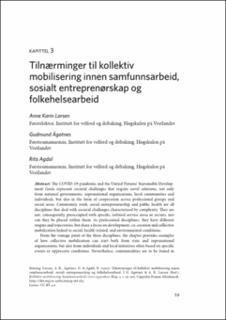Tilnærminger til kollektiv mobilisering innen samfunnsarbeid, sosialt entreprenørskap og folkehelsearbeid
Chapter, Peer reviewed
Published version

Åpne
Permanent lenke
https://hdl.handle.net/11250/3060656Utgivelsesdato
2022Metadata
Vis full innførselSamlinger
- Import fra CRIStin [3621]
- Institutt for velferd og deltaking [1020]
Originalversjon
10.23865/noasp.168.ch3Sammendrag
The COVID-19-pandemic and the United Nations’ Sustainable Development Goals represent societal challenges that require novel solutions, not only from national governments, supranational organisations, local communities and individuals, but also in the form of cooperation across professional groups and social areas. Community work, social entrepreneurship and public health are all disciplines that deal with societal challenges characterised by complexity. They are not, consequently, preoccupied with specific, isolated service areas or sectors, nor can they be placed within them. As professional disciplines, they have different origins and trajectories, but share a focus on development, co-creation and collective mobilisation linked to social, health-related, and environmental conditions. From the vantage point of the three disciplines, the chapter provides examples of how collective mobilisation can start both from state and supranational organisations, but also from individuals and local initiatives often based on specific events or oppressive conditions. Nevertheless, commonalities are to be found in how collective mobilisation is predicated on a willingness to cooperate and has an inherent goal of ensuring sustainable development leading to significant results for participants. Collaboration and sustainability serve as analytical turning points when we discuss whether methods aimed at achieving sustainable results are shared or different in the three disciplines. The chapter sheds light on the ways in which the disciplines complement each other and the roles they play as actors within the welfare state.
